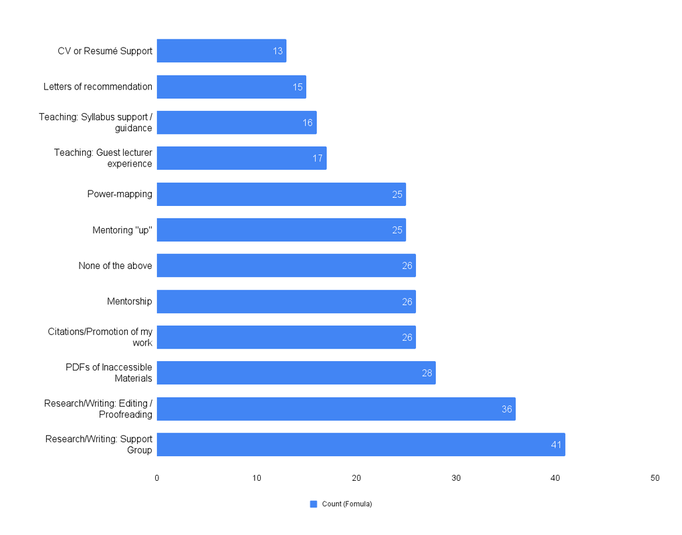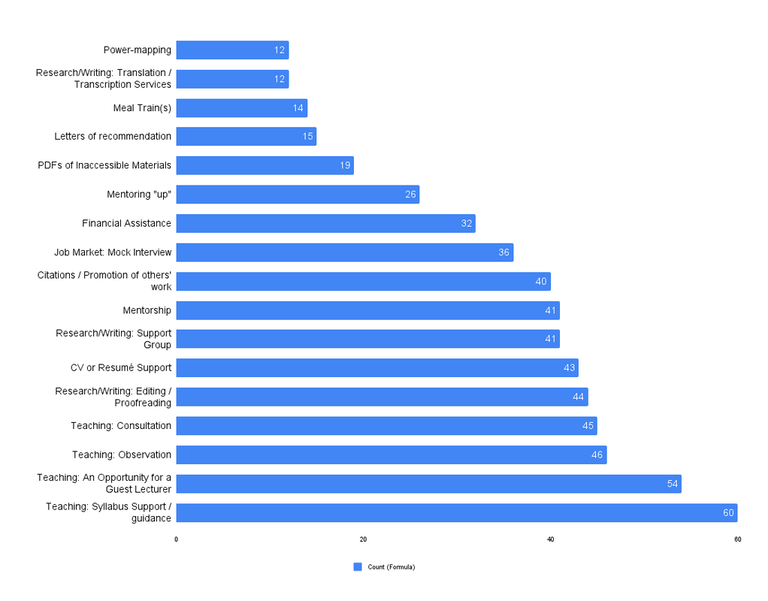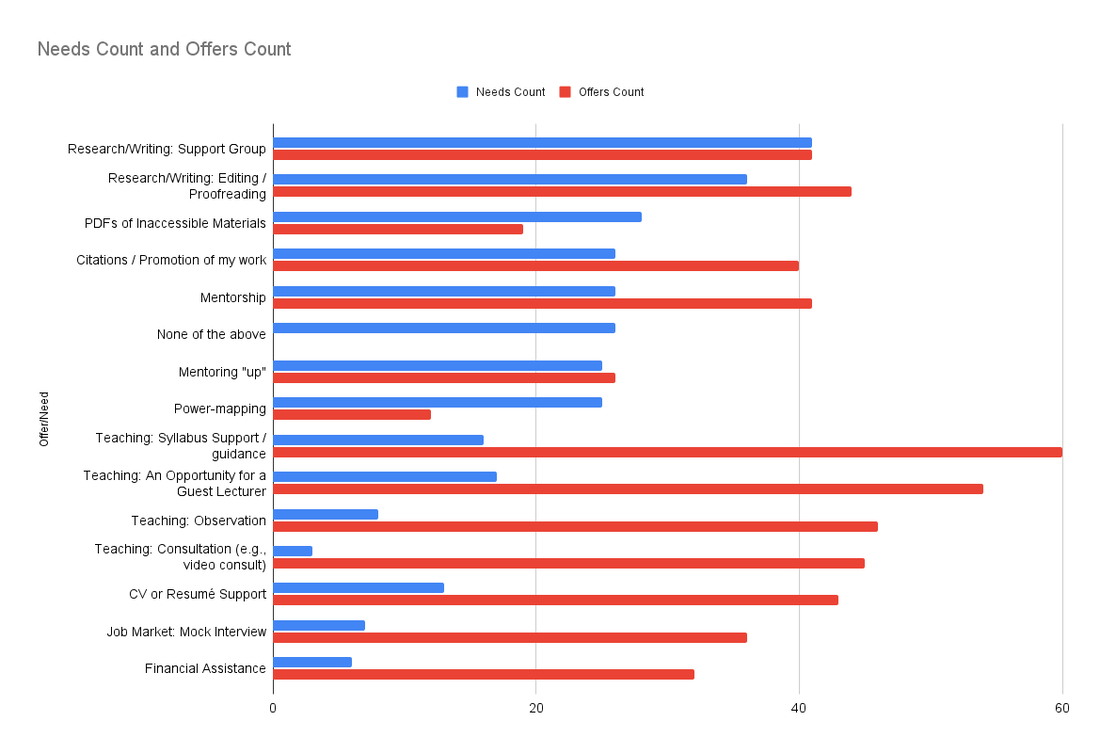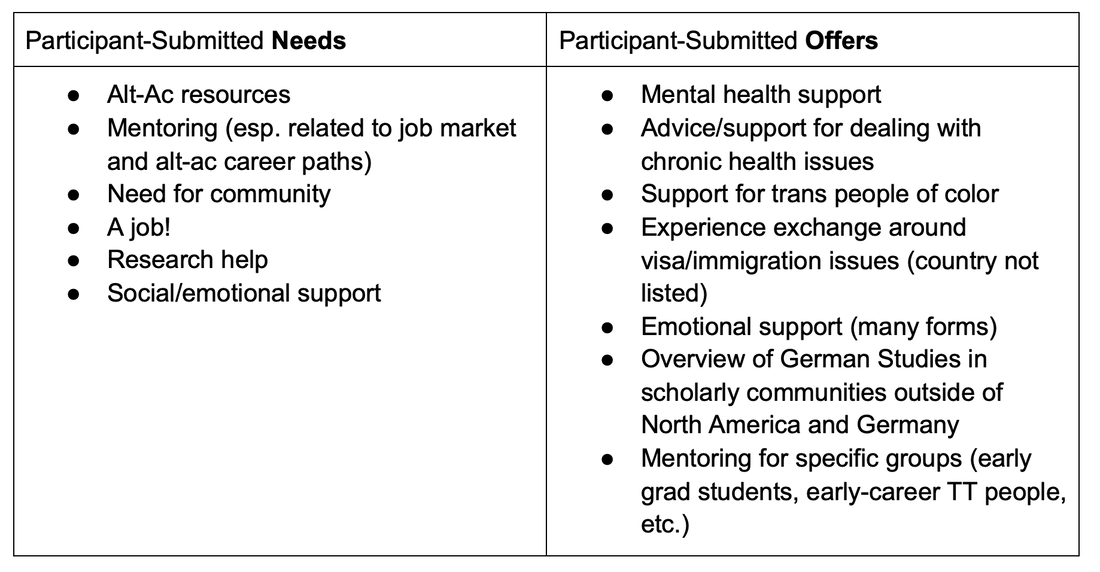|
The DDGC Mutual Aid Action Group was constituted in December 2020 with the intention of creating a DDGC Mutual Aid Network. During the initial meetings, we deliberated how to get started with our work. We recognized the dire need for a network of professional, personal, social, material, and financial support for people in and around German studies. But we wondered: how we could determine what those needs are, and how could we create a system to address them? Furthermore, we asked ourselves, how could we be sure that the network we wanted to build would be able to meet those needs? To better understand the needs and capacities of people in German studies, we created a survey. The survey was based on two important questions: What do you need? What can you provide? We allowed participants to answer these questions by selecting categories of aid from a pre-written list, and we also included questions prompting participants to submit offers and needs that we had not considered. Once we were happy with the survey format, we circulated it between January 25 and February 12, 2021, through as many professional and social networks as possible. By the end of this period, we had received a total of 111 anonymous responses. In this blog post, we want to outline some results from this survey, offer our perspective on what these results might mean, and invite other people in and around German studies to think with us about how to design a network that will meet the needs our survey revealed. By sharing these findings, we acknowledge our own biases that we had in designing the survey and hope to open up a conversation about how to make the DDGC Mutual Aid Network a resource that can respond to the real needs of people in and around German studies. Needs The first survey question asked, “What do you need?” This question allowed participants to select any number of needs from a list that we had written in advance. Below is a chart showing some of the categories that ranked the highest, by count, out of our 111 responses. There are a few things to note about the results of this first question. One is that support for research dominates the top categories. Respondents articulated a need for writing groups, editing/proofreading, and access to research materials. Another interesting result is the high count of responses in the “None of the above” category (in a 3-way tie for 4th place). When we were reviewing the results of this survey as a group, we puzzled over this result for a while. What did this mean? Which group(s) might be consistently choosing this response? We came up with several hypotheses. Did colleagues in more stable positions feel bad about asking for help? Did people feel bad in general about asking for help? Or perhaps, did people have other forms of “helping” in mind when they filled out the survey? Did the historical and cultural prevalence of “charity,” a form of helping which tends to ossify distinctions between those who offer and those who receive help, overdetermine participants’ thinking about what mutual aid is? In a year of multiple, overlapping crises (e.g., the COVID-19 pandemic, anti-Black and police violence, mass unemployment, the stress of emergency online-teaching, and a dismal job market, to name a few), it seemed to us very unlikely that so many of our colleagues were really unaffected. Ultimately, given the structure of our survey, we could not come to a definitive answer on this question. But this should not come as a surprise, either: the concept of mutual aid is a radical redefining of how we relate to each other, how we understand ourselves, our needs, and our capacities. Decades of institutional, organizational, and social structures, which encourage us to hide our material, social, emotional, financial, and professional needs, have harmed our capacity to actually acknowledge our vulnerabilities and ask for help. We ultimately saw this result as further evidence that the work of mutual aid is not just one of organizing, but of unlearning old habits which isolate us from each other, which encourage competition over cooperation and support, and which trap us in endless loops of rationalizing our own situation as “not really all that bad.” For a detailed analysis of these factors, see Emily Frazier-Rath and Maggie Rosenau’s recently published DDGC Blog Post. What is radical about mutual aid is the way it makes us confront the fact that we all need something, we all have something we can give, and that we all deserve better. As Dean Spade notes in his book Mutual Aid: Building Solidarity During this Crisis (and the Next) (2020), “collective spaces, like mutual aid organizing, can give us opportunities to unlearn conditioning and build new skills and capacities. By participating in groups in new ways and practicing new ways of being together, we are both building the world we want and becoming the kind of people who could live in such a world together” (17). Changing relations among people brought together under the auspices of German studies through a mutual aid framework will take time and energy to enact. We hope that these first discussions around what this would look like in our time will usher in a more just future. Offers The second survey question asked “What can you offer?” Again, participants could select any number of needs from a list that we had written in advance. Below is a chart showing some of the categories that ranked the highest, by count, out of our 111 responses. As can be seen above, the top responses to this question are higher counts than most of the counts for “needs” in the previous question (the highest count for “needs” was 41 for “Writing Group,” while 8 of the top categories of “offers” were a count of 41 or higher). Offers to support colleague’s teaching were the most common, followed by offers pertaining to professionalization (CV/resume, mentorship, mock interviews). Interestingly, we also see more categories related to material and financial needs (financial assistance, meal-trains), in contrast to the previous question. As to why offers differ from needs in these ways, there are many possible explanations. Perhaps people in German studies feel better prepared to offer teaching and research assistance, or see those skills as the most important ones they imagine others might need. Or, perhaps, in a particularly busy and stressful year, these kinds of offers feel “feasible,” the kinds of support that participants feel they could commit to offering. Others may see different trends in these results, and we hope that you will share your perspectives with us as we build our mutual aid network. Top Needs Compared with Top Offers One helpful way of determining the capacity of our network to meet needs is to compare the “top needs” with the “top offers” from the survey. The chart below compares a more limited selection of the “biggest needs” against the “biggest offers,” showing where needs and offers are approximately equal, where offers greatly exceed need, and where needs greatly exceed offers, by count. One fortunate tendency that can be seen here is that offers almost always exceed needs, meaning that our network would quite often be able to provide what people need. Conversely, there seems to be a disconnect, especially around teaching, between what people need and what they feel they could offer: in general, participants are very willing to help with teaching-related needs, but few participants believed they would request that kind of aid. To reiterate a point above, these discrepancies in our survey results might reflect more on the organization of our profession than they represent what people really need, if they knew they could or even should ask for it. While one might read this chart and assume that financial assistance was a low-priority need for our network, it could also be that we just do not have any experiences of helping each other, financially, to draw on when thinking about what we might need when prompted. Needs and Offers Proposed by Survey Participants In two separate questions, we also allowed survey participants to submit needs and offers that we had not thought of in advance. These questions yielded important results, while also pointing to some weaknesses in our survey design. Below are a few examples (presented in summary) of the kinds of offers and needs that participants submitted. As we work toward building a platform for requesting and offering mutual aid, we will be incorporating categories for these participant-submitted offers and needs.
Conclusion Ultimately, the analysis and reflections here are a starting point for a broader conversation about what a mutual aid network for people in and around German studies could look like. One thing, however, is very clear: there is a great amount of need, and a great number of people who want to help. As we continue the process of building our network, we aim to foster a community and dialogue around mutual aid, reducing the stigma that surrounds vulnerability in our field and supporting people in and around German studies. For more information and updates about the DDGC Mutual Aid Network, check our Mutual Aid Action Group webpage. If you have thoughts, suggestions, needs, or want to get involved, please email us at ddgc.mutualaid [at] gmail [dot] com. Bibliography Frazier-Rath, Emily, and Maggie Rosenau. “Mutual Aid in our German Studies Communities: Why and How to Do Collective Organizing and Care Work in Academia.” DDGC Blog. May 25, 2021. https://diversityingermancurriculum.weebly.com/ddgc-blog-submission-info.html. Accessed May 31, 2021. Spade, Dean. Mutual Aid: Building Solidarity During this Crisis (and the Next). New York: Verso, 2020.
0 Comments
|
Editorial Collective & Submission Information
The DDGC Blog is edited by an editorial collective. For more info about the collective and extensive submission information, click here. We want to amplify your ideas. Have an idea for a short or long post? We'd be glad to talk about it and help you get it published. Archives
January 2023
|




 RSS Feed
RSS Feed
